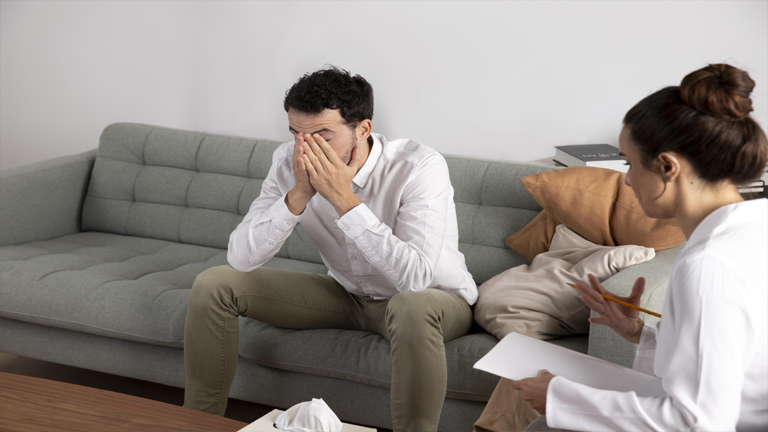Anxiety is a common mental health condition affecting millions worldwide. While occasional anxiety is normal, chronic anxiety can interfere with daily life. Fortunately, various anxiety treatment options exist, ranging from therapy and medication to lifestyle changes and natural remedies. This comprehensive guide explores the most effective treatments, helping you regain control over your mental well-being.
Must Check: Insomnia Symptoms
Understanding Anxiety: Causes and Symptoms
Before diving into anxiety treatment, it’s essential to understand what anxiety is and how it manifests.
Common Causes of Anxiety
-
Genetic factors (family history of anxiety disorders)
-
Brain chemistry imbalances (low serotonin or GABA levels)
-
Environmental stressors (work pressure, financial issues, trauma)
-
Medical conditions (thyroid disorders, heart disease)
-
Substance abuse (caffeine, alcohol, drugs)
Symptoms of Anxiety
-
Physical symptoms: Rapid heartbeat, sweating, trembling, fatigue
-
Emotional symptoms: Excessive worry, irritability, fear of losing control
-
Cognitive symptoms: Difficulty concentrating, racing thoughts
-
Behavioral symptoms: Avoidance of triggering situations
Recognizing these signs is the first step toward seeking the right anxiety treatment.
Effective Anxiety Treatment Options
1. Psychotherapy (Talk Therapy)
Psychotherapy is one of the most effective anxiety treatments, with several evidence-based approaches:
Cognitive Behavioral Therapy (CBT)
-
Helps identify and change negative thought patterns
-
Teaches coping mechanisms for anxiety triggers
-
Proven effective for generalized anxiety disorder (GAD), panic disorder, and social anxiety
Exposure Therapy
-
Gradually exposes patients to feared situations in a controlled manner
-
Effective for phobias and PTSD
Acceptance and Commitment Therapy (ACT)
-
Encourages mindfulness and acceptance of anxious thoughts
-
Focuses on value-driven actions rather than avoidance
2. Medication for Anxiety
For severe cases, doctors may prescribe medications alongside therapy:
Selective Serotonin Reuptake Inhibitors (SSRIs)
-
Examples: Prozac, Zoloft, Lexapro
-
Increases serotonin levels to improve mood
Benzodiazepines
-
Examples: Xanax, Valium
-
Provides fast relief for acute anxiety (short-term use only due to addiction risk)
Beta-Blockers
-
Examples: Propranolol
-
Reduces physical symptoms like rapid heartbeat
3. Lifestyle Changes for Anxiety Management
Natural anxiety treatment strategies can significantly reduce symptoms:
Regular Exercise
-
Releases endorphins, improving mood
-
Yoga and tai chi promote relaxation
Healthy Diet
-
Omega-3 fatty acids (found in fish) reduce inflammation linked to anxiety
-
Magnesium-rich foods (spinach, almonds) help calm the nervous system
Sleep Hygiene
-
Poor sleep worsens anxiety; aim for 7-9 hours nightly
-
Avoid screens before bedtime
4. Alternative and Natural Remedies
For those seeking drug-free anxiety treatment, consider:
Meditation and Mindfulness
-
Reduces stress and improves emotional regulation
-
Apps like Headspace and Calm offer guided sessions
Herbal Supplements
-
Chamomile tea: Natural relaxant
-
Lavender oil: Reduces nervousness (aromatherapy or supplements)
Acupuncture
-
Traditional Chinese medicine technique that may balance stress hormones
Self-Help Strategies for Anxiety Relief
In addition to professional anxiety treatment, self-care plays a crucial role:
Breathing Techniques Anxiety Treatment
-
4-7-8 Breathing: Inhale for 4 sec, hold for 7 sec, exhale for 8 sec
-
Helps activate the parasympathetic nervous system (calming effect)
Journaling Anxiety Treatment
-
Writing down worries can reduce overthinking
-
Gratitude journals shift focus to positive aspects of life
Social Support Anxiety Treatment
-
Talking to friends or joining support groups reduces isolation
-
Peer support networks provide shared coping strategies
When to Seek Professional Help Anxiety Treatment
While self-help strategies are beneficial, professional anxiety treatment is necessary if:
-
Anxiety disrupts work, relationships, or daily functioning
-
Physical symptoms (chest pain, dizziness) become severe
-
Suicidal thoughts arise
A mental health professional can tailor a treatment plan to your needs.
Conclusion
Managing anxiety requires a multi-faceted approach, combining therapy, medication (if needed), lifestyle changes, and self-care. By understanding the available anxiety treatment options, you can take proactive steps toward mental wellness. If anxiety feels overwhelming, don’t hesitate to seek professional help—effective treatments can lead to lasting relief.
Would you like recommendations for anxiety therapists or further reading on specific treatments? Let us know in the comments!


